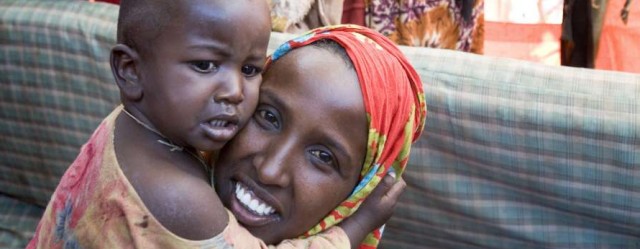Home > What We Do > Assistance > Nutrition and Food Security
Nutrition and Food Security

A Healthy Diet for A Healthy Life
Ensuring that people have access to adequate nutrient-rich food and safe water is essential for protecting the safety, health and well-being of refugees and other populations of concern. For this reason, UNHCR strives to improve the nutritional status of all the people it serves - mostly women and children.
The right to freedom from hunger and malnutrition is also backed by international conventions, as is the right to the highest standards of health and health care. Moreover, the goals of ensuring that forcibly displaced people have access to adequate health services, food security, water and improved nutrition are included in UNHCR's Global Strategic Objectives for 2008-2012.
The UN refugee agency works to achieve these targets, as well as the goal of ensuring international nutrition standards for all people of concern, through strategic funding and by working in partnership with the World Food Programme (WFP) and other governmental and non-governmental partners. UNHCR implements the most up-to-date nutritional and food security approaches and technologies in programmes and policies.
UNHCR, which is the lead agency in coordinating refugee nutrition, has also identified essential packages to improve services for populations in need in the areas of nutrition and micronutrients as well as related areas such as reproductive health, malaria and child survival.
In addition, greater emphasis and resources are being put into building the capacity of UNHCR and its partners through training, standard guidelines, strategic plans and additional staffing, coordination and appropriate programme practices.
There is a clear link between nutrition and public health. Communicable diseases brought on in part by malnutrition are responsible for millions of preventable deaths each year. Mass population movements can result in high rates of malnutrition, sickness and death. Shortage of food also makes people more vulnerable to sexual abuse and exploitation. Poor quality dierts contribute to delayed childhood development, cayusing irreprabale damage due to vitamin and mineral deficiencies.
For those UNHCR serves who are living with chronic illnesses, in particular HIV/AIDS, adequate nutrition is vital in maintaining an individual's immune system.
UNHCR monitors the nutrition of people of concern through the Health Information System, regular surveys and nutrition-related databases.
 Nutrition and Food Security Strategies and Policies
Nutrition and Food Security Strategies and Policies
- Memorandum of Understanding between UNHCR and WFP, January 2011
- Global Strategy for Public Health: A UNHCR Strategy 2014-2018 Public Health - HIV and Reproductive Health - Food Security and Nutrition - Water, Sanitation and Hygiene (WASH)
- UNHCR policy related to the acceptance, distribution and use of milk products in refugee settings
 Nutrition and Food Security Guidelines
Nutrition and Food Security Guidelines
- Guidelines on HIV and Infant Feeding 2010 (external link)
- Guidelines for Nutrition Surveys
- Infant and young child feeding practices: Standard Operating Procedures for the Handling of Breastmilk Substitutes (BMS) in Refugee Situations for children 0-23 months
- Infant and young child feeding practices: Standard Operating Procedures for the Handling of Breastmilk Substitutes: ANNEXES
- UNHCR Operational Guidance on the Use of Special Nutritional Products to Reduce Micronutrient Deficiencies and Malnutrition in refugee Populations
- Guidelines for Selective Feeding: The Management of Malnutrition in Emergencies
 Nutrition and Food Security Assessment, Monitoring, Evaluation
Nutrition and Food Security Assessment, Monitoring, Evaluation
- Nutval.net: The Planning, Calculation and Monitoring Application for General Food Aid Rations (external link)
- Malawi: Joint Assessment Mission Report. Dzaleka Refugee Camp (November 2014)
- Yemen: Joint Assessment Mission Report (October 2015)
- Tanzania: Joint Assessment Mission (2013)
- Zimbabwe: Joint Assessment Mission (2014)
- Ethiopia: Joint Assessment Mission (2014)